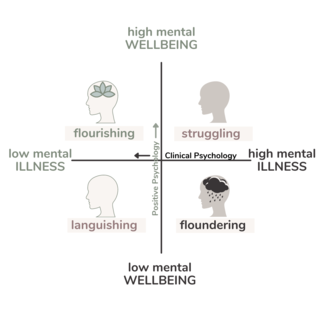Health
What Does It Mean to Languish?
Languishing is not the same as having a mental illness.
Posted December 1, 2021 Reviewed by Gary Drevitch
Key points
- Mental health has two parts: the absence of mental illness and the presence of mental well-being
- Languishing is what we feel in the absence of mental well-being.
- Positive psychology addresses the pathway from languishing to flourishing

The dictionary definition of languishing is “failure to make progress or be successful”—like, “he was languishing in the same job he had held for 15 years.” Yikes. The shorter but equally brutal verb form, languish, is defined as “to become feeble, weak, or enervated” —such as, “The entire population began to languish as the pandemic swept through the world, no matter how many times they ‘pivoted.’”
Without a doubt, languishing is the buzzword of the year, with good reason. Corey Keys first coined the term in 2002, and this year, organizational psychologist Adam Grant wrote an article for the New York Times calling languishing the “dominant emotion of 2021.”
But what exactly does it feel like and how do you know you're langushing?
Synonyms for languishing include deteriorating, dwindling, wilting, rotting, and withering, but to be honest, if I were to use another word instead of languishing, it would be 'blah' or 'meh'—the total resignation of anything positive, with no dire negative emotional states or responses.
While no synonyms can replace languishing exactly, if you use the above words and apply them to an image of your own brain/mind/well-being, then you probably have a reasonable representation of what it means to languish.
What does languishing feel like?
Languishing can be described as having a lack of direction, a sense of apathy and stagnation, and a deep knowledge that you are not operating at your full capacity. If you’re languishing, you may feel ‘neutral’ or ‘numb’ rather than positive or thriving, but not have any symptoms of more serious mental health conditions or diagnoses, such as persistent negative thinking patterns and emotional states. Your general response to ideas or plans is ‘Meh’, and while you know you could do more, you lack the motivation and drive to do much of anything. Disconnected, indifferent…blah.
As Adam Grant puts it, “It wasn’t burnout—we still had energy. It wasn’t depression—we didn’t feel hopeless. We just felt somewhat joyless and aimless…a sense of stagnation and emptiness. It feels as if you’re muddling through your days, looking at your life through a foggy windshield.”
Is languishing a mental illness?
In short, no: Languishing is not a mental illness. This may be why it has not readily been spoken about until recently. Generally, people think of mental health as either ‘having a mental illness’ or ‘not having a mental illness.’ However, in order to be mentally healthy, we need two things: the absence of mental illness and the presence of mental well-being.
Languishing and mental illness are related, but on a different scale. Existing in a state of languishing can potentially predispose us to mental health conditions, particularly if we experience ongoing negative life events or circumstances while we are languishing.
Mental illness is addressed (and sought to be eliminated) by clinical or traditional psychology. Mental well-being is addressed by positive psychology.

How do I move from languishing to flourishing?
This is the million-dollar question, and one that positive psychology helps us to understand and answer. Because the brain is amazing and humans are adaptable creatures, we have the capacity to shift ourselves into a higher state of mental well-being while enduring circumstances which are less than optimal.
While we may not hit the high points of flourishing straight away, we can certainly prime ourselves for this and use strategies that help to stop languishing in its tracks.
References
Corey L. M. Keyes. (2002). The Mental Health Continuum: From Languishing to Flourishing in Life. Journal of Health and Social Behavior, 43(2), 207–222. https://doi.org/10.2307/3090197


